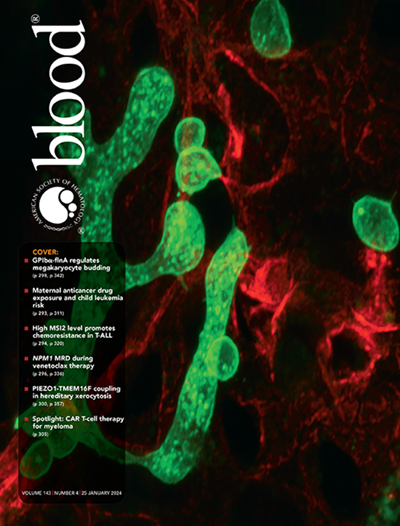A 型血友病患者的唾液通过外在酶复合物引发凝血。
IF 21
1区 医学
Q1 HEMATOLOGY
引用次数: 0
摘要
人类唾液中含有细胞外囊泡 (EV)。这些细胞外小泡暴露于组织因子(TF)和活化因子 VII(FVIIa)的细胞外tenase 复合物,并触发血液凝固。在这里,我们发现在严重血友病 A 患者(即 FVIII 缺乏症患者)的唾液中也存在暴露外在tenase 复合物的 EVs。将这些唾液 EV 添加到自体 FVIII 缺乏症患者的血液中会导致 FXa 的生成,从而弥补通过内在tenase(FVIIIa/FIXa)复合物生成 FXa 的不足。同样,在我们对未进行预防性 FVIII 替代的重度 A 型血友病患者进行的回顾性分析中,口咽粘膜出血并不常见,而且是自限性的。相反,在严重 FVII 缺乏症患者的唾液中,由于 EVs 缺乏 FVII,口咽出血很常见,因此不存在功能性腱膜外酶复合物。严重 FVII 缺乏症患者的唾液无法恢复血液凝固,这是因为他们的唾液和血液中都缺乏 FVII。微摩尔水平的重组 FVIIa 可以恢复 FVII 缺乏者唾液的凝血潜能。综上所述,我们的研究结果可以解释为什么 A 型血友病患者很少发生口咽出血,以及为什么严重 FVII 缺乏症患者会发生口咽出血。本文章由计算机程序翻译,如有差异,请以英文原文为准。
Saliva from persons with hemophilia A triggers coagulation via extrinsic tenase complexes.
Human saliva contains extracellular vesicles (EVs). These EVs expose extrinsic tenase complexes of tissue factor (TF) and activated factor VII (FVIIa), and trigger blood coagulation. Here, we show that EVs exposing extrinsic tenase complexes are also present in saliva of persons with severe hemophilia A, i.e. persons with FVIII deficiency. Addition of these salivary EVs to autologous FVIII-deficient blood results in FXa generation, thereby compensating for the lack of FXa generation via intrinsic tenase (FVIIIa/FIXa) complexes. Consistently, in our retrospective analysis of persons with severe hemophilia A who do not perform prophylactic FVIII substitution, oropharyngeal mucosal bleedings are infrequent and self-limited. Conversely, in saliva from persons with severe FVII deficiency, in whom oropharyngeal bleedings are prevalent, functional extrinsic tenase complexes are absent, because EVs lack FVII. Saliva from persons with severe FVII deficiency is unable to restore blood coagulation, which is due to the absence of FVII in both their saliva and blood. Picomolar levels of recombinant FVIIa can restore the coagulant potential of saliva from FVII deficient persons. Taken together, our findings may explain the paucity of oropharyngeal bleedings in persons with hemophilia A as well as the occurrence of such bleedings in persons with severe FVII deficiency.
求助全文
通过发布文献求助,成功后即可免费获取论文全文。
去求助
来源期刊

Blood
医学-血液学
CiteScore
23.60
自引率
3.90%
发文量
955
审稿时长
1 months
期刊介绍:
Blood, the official journal of the American Society of Hematology, published online and in print, provides an international forum for the publication of original articles describing basic laboratory, translational, and clinical investigations in hematology. Primary research articles will be published under the following scientific categories: Clinical Trials and Observations; Gene Therapy; Hematopoiesis and Stem Cells; Immunobiology and Immunotherapy scope; Myeloid Neoplasia; Lymphoid Neoplasia; Phagocytes, Granulocytes and Myelopoiesis; Platelets and Thrombopoiesis; Red Cells, Iron and Erythropoiesis; Thrombosis and Hemostasis; Transfusion Medicine; Transplantation; and Vascular Biology. Papers can be listed under more than one category as appropriate.
 求助内容:
求助内容: 应助结果提醒方式:
应助结果提醒方式:


